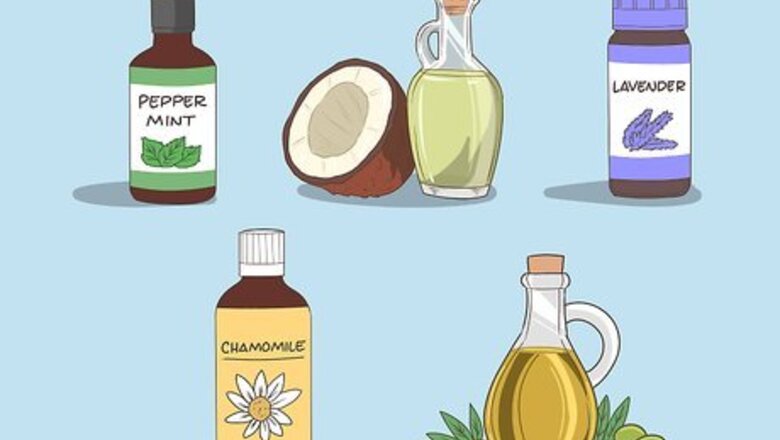
views
Treating Physical Ailments
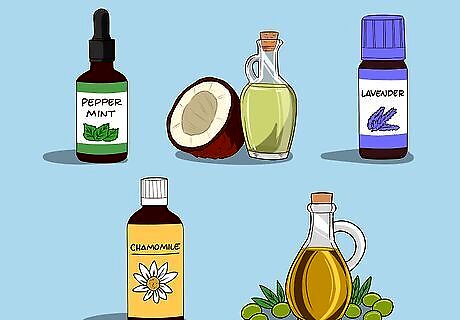
Look at using essential oils to treat pain and inflammation. Many people find relief using essential oils to treat everything from headaches to bug bites. For example, some oils have analgesic results when used on the skin (relieving pain) or anti-inflammatory effects on muscles. For example, chamomile essential oil has been known to stop headaches and muscle spasms related to PMS. Lavender essential oil is commonly used to treat insomnia because its scent promotes relaxation. Peppermint essential oil is often used to relieve headaches and muscle aches because of its anti-inflammatory properties. (This oil should be avoided around children under age 6.) Essential oils should be diluted with a carrier oil like olive oil or coconut oil and rubbed onto the skin. It is very important to only use two or three drops at a time, and to always use them with a carrier oil to keep them from irritating your skin. Do research before using them on children.
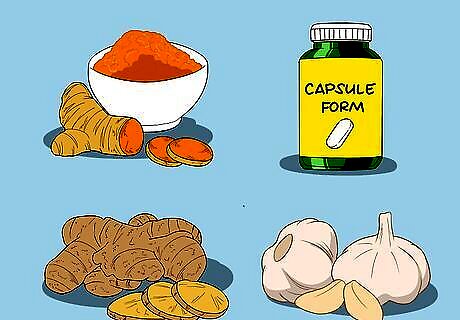
Investigate herbal remedies for common conditions. Herbs are another treatment option that many people use. Most kitchens are stocked with herbs for cooking, making them cheap and easy to access. For example, the spice turmeric can relieve muscle soreness because it reduces the enzyme that causes arthritis swelling. Another useful herb is ginger, which is often used to reduce nausea. Its properties block serotonin and free radical production, both of which cause an upset stomach. Garlic has a host of benefits, including reducing blood pressure, promoting cardiovascular health, and preventing strokes. Most herbal remedies can be diluted into water (like when making tea) or added to healthy dishes (like a salad). Many, however, can be purchased in capsule form and swallowed like vitamin tablets.
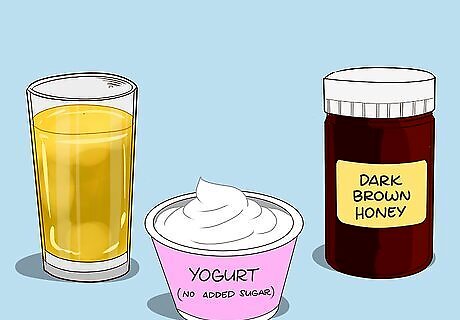
Learn how changing your diet may help prevent or cure ailments. Herbs are not the only things you can eat or swallow that can provide a cure to physical ailments. Different foods, when consumed more frequently when you need relief, can bring quick physical aid. Although food is often more helpful as a preventive measure, some foods can provide relief in a day or so. For example, yogurt, when eaten without added sugars, can aid digestive health and reduce gas. Dark brown honey can relieve a cough (though don’t use this solution for babies under the age of 12 months). Two teaspoons diluted into a cup of tea is an effective way to consume honey. Orange juice can resolve afternoon drowsiness and renew your energy.
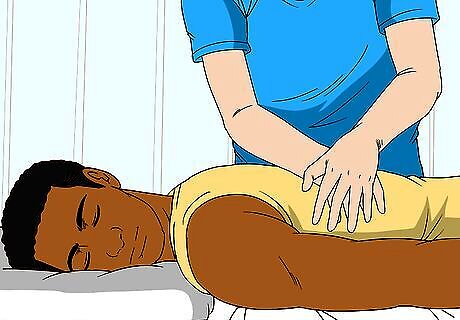
Use alternative practitioners for treating pain. Holistic medicine, such as at a chiropractor, acupuncturist, massage therapist, or other practitioner, can prevent your body from experiencing pain. For example, most chiropractors like to treat patients on a monthly basis to prevent pain from returning.
Preventing Illness
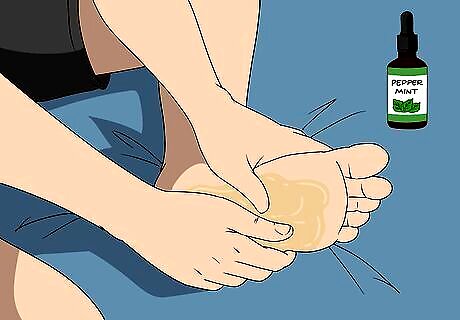
Apply essential oil to your skin daily for disease prevention. You can use essential oils to prevent illness. To use essential oils as prevention, you can apply them to your skin on a daily basis, or at least 3 or 4 times a week. In fact, some say the best way is to dilute them in a carrier oil and rub them on the bottoms of your feet at bedtime to generally boost your immune system. A carrier oil is a basic oil like olive oil or coconut oil, and you mix one or two drops of essential with it before rubbing it into your skin. Essential oils are very powerful, and diluting them in other oil prevents them from irritating your skin. Oils that are good to rub on your feet at night to boost the immune system include lavender, lemon, pine needle, and tea tree. Use one at a time or a combination of two or three, but do not exceed four drops on each foot with the carrier oil. Use half this amount on children, and make sure it is safe to use each oil on a child. Most oils are safe after age 6, but certain oils like eucalyptus and peppermint should not be used on young children. Don’t bathe for 7 hours after applying the oil so that you get the full benefits. Essential oils can be found in many locations, such as vitamin stores, drug stores, health food stores, or from individuals who sell them from home.
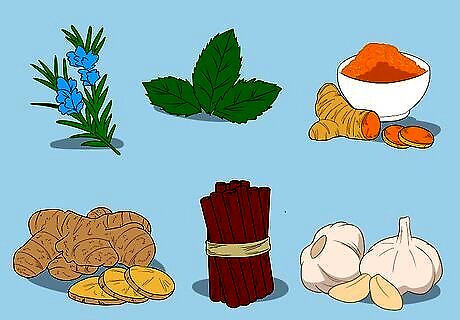
Consume herbs that may help prevent certain ailments. Herbs can be a very effective way to prevent illness. When you consume herbs on a regular basis, you are able to boost your immune system. In fact, herbs have been used for hundreds of years as preventive measures for illness. Many herbs have been shown to prevent cancer: turmeric may prevent colon cancer, rosemary may stop tumors from growing, and holy basil may prevent breast cancer. Herbs also have a reputation for improving heart health: cinnamon lowers cholesterol, ginger lowers blood pressure, and garlic improves the cardiovascular system as a whole.
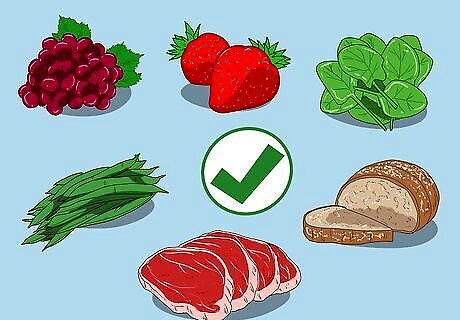
Eat nutritious foods that help support your immune system. Food and weight have always played a major role in our overall health. Having a healthy weight prevents many of the health problems that come with obesity, such as increased cholesterol and risk of heart disease. Eating the right foods can also help you prevent cancer and other diseases. For example, eating foods rich in antioxidants like berries, spinach, and beans can prevent free radicals from overwhelming your system and growing tumors. Eat lean meats and whole grains to prevent iron deficiency.
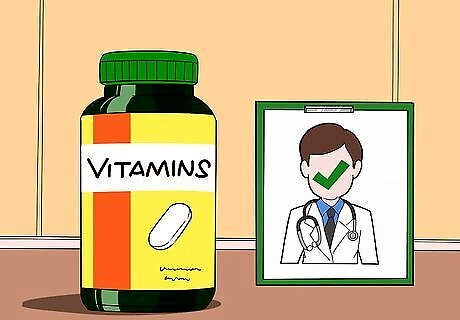
Take vitamins to increase your nutrient intake. If you are eating a balanced diet, you don’t need a lot of vitamin supplements. But many of us don’t eat a perfectly balanced diet. A diet severely deficient in vitamins can allow your body to break down faster so that you end up with things like joint pain and skin discoloration. Taking vitamins can prevent a breakdown of health. For example, vitamin B12 deficiency can cause numbness, weakness, fatigue, and difficulty walking. Always check with your doctor before using vitamins or supplements.
Improving Mental Health
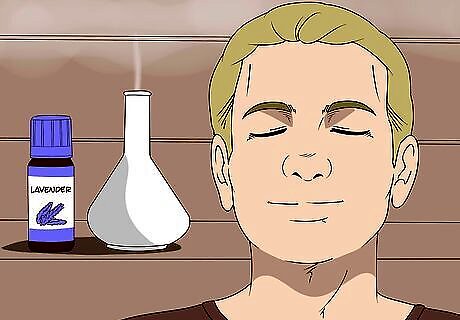
Find out how essential oils may help. Your physical body isn’t the only part of you that can benefit from natural remedies. People take medications for ailments of the mind like anxiety and depression, and essential oils can be used for mental problems as well. The aroma of many different oils can boost your mood and clear your mind. Oils like bergamot, frankincense, and lavender may banish the blues of depression. Anxiety may be relieved with many different oils, but one reliable mixture is lavender, ylang ylang, and bergamot. Clary sage may clear your mind and make you feel calm. The aromatherapy practice of essential oils includes several different mediums. You can put a few drops on a piece of cloth and hold it to your nose; you can place a few drops in an essential oil diffuser, which is a small version of a cool mist humidifier; or you can place a few drop of oil in boiling water or a bowl of dry rice.
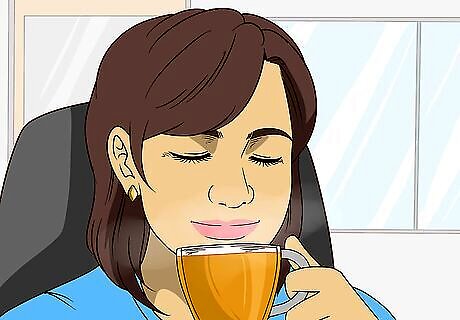
Consider how herbs can change your mood. Specific herbs can help you feel better if you are depressed or feeling stressed. Herbs for mental health can be taken as both extracts (usually dropped into a tea) or in pill form as supplements. Not all herbs do this, but if you find the right ones, you may start improving your quality of life. For example, the extract of holy basil (usually available in health food stores) can be added to tea and sipped at home. Holy basil reduces stress by increasing adrenaline and decreasing serotonin levels. St. John’s wort can help boost mood and relieve anxiety because of the phytochemical hypericin. Just alert your doctor before use because it can interact with several medications.
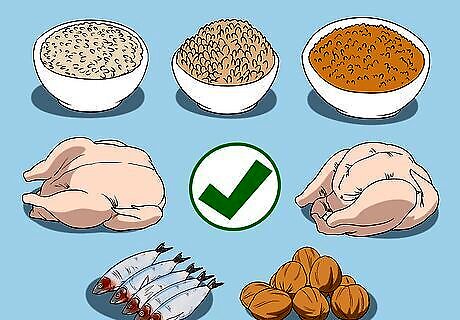
Eat nutritious foods and lean proteins for good mental health. Food has a profound effect on the way we feel and think. When you eat a lot of simple sugars, blood sugar spikes may wreck your mood. On the other hand, the complex carbs of whole grains and the steady energy from lean protein levels your blood sugar supply. Likewise omega 3 fatty acids have been shown to reduce symptoms of schizophrenia and depression. In general, what we eat may be an important part of treating mental troubles. Whole grains such as oats, brown rice, and barley may be good for the mind. Lean protein like chicken and turkey provide amino acids for the brain to use. Turkey’s famous by-product, tryptophan, produces serotonin. Omega 3 fatty acids can be found in foods like fish and walnuts.
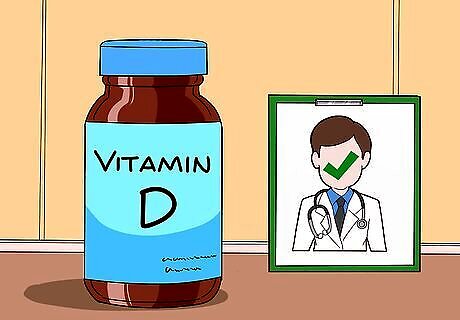
Take vitamin supplements to boost your mood. Low levels of specific vitamins are linked to mood disorders like depression. For example, vitamin D deficiency is key for bone health, but it is also important because the brain actually contains vitamin D receptors and they are located in areas of the brain associated with depression. Check with your doctor before taking any vitamins or supplements.
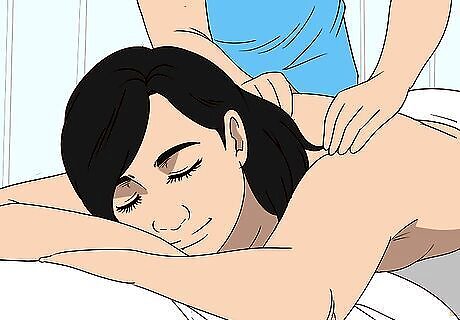
Seek holistic alternatives for mental clarity. Exercise in general helps to relieve stress, and when you couple this with the body mechanics that are encouraged at most holistic practitioners, you are assured some release of stress. For example, massage therapy uses human touch to relieve tension in muscles, but also releases emotional tension.
When to Seek Medical Care
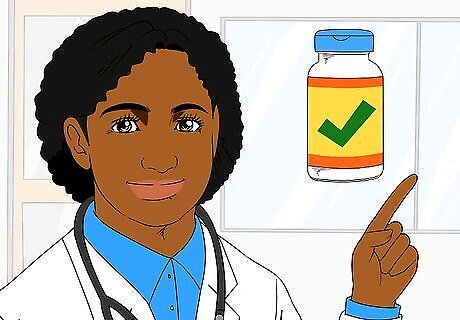
Check with your doctor before using natural remedies. Although natural treatments are generally safe, they aren’t right for everyone. You may be allergic to some essential oils or herbs, and it’s possible for natural treatments to interfere with traditional medicine. Talk to your doctor about your desire to use natural remedies and what you’re hoping to treat. They can help you decide what’s safe for you to try. If you’re taking medications, your pharmacist may also be able to help you avoid natural remedies that will interfere with your treatment.
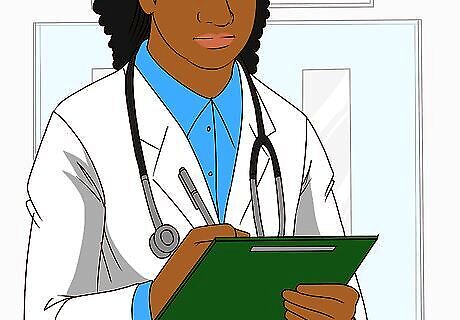
Visit your doctor for a diagnosis before treating your condition. While natural remedies can help, you need to know what condition you’re treating. Your doctor can examine you and potentially conduct diagnostic tests to find out what’s causing your symptoms. Then, they’ll help you create a treatment plan that works for you, which can include natural remedies. Treating an ailment that you don’t have can cause more harm than good. It’s best to confirm your diagnosis before you get started. Tell your doctor that you’d prefer to use natural remedies whenever possible. You don’t have to take medications if you don’t want to do so.
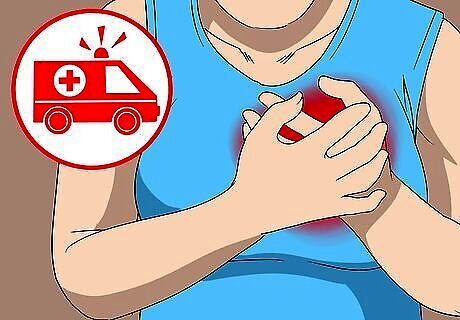
Get emergency medical care for symptoms of a serious illness. While you likely don’t need to worry, you should seek immediate treatment if you may have a serious medical condition. Don’t try to treat your symptoms by yourself because your condition could become life-threatening. Visit an emergency room or call for help if you may have the following: Chest pain or trouble breathing Vomiting or coughing up blood Stroke Heart attack Heavy bleeding Large, blistering, or open burns Possible broken bones Poisoning Severe allergic reaction Shock Sudden, severe pain Worsening of an existing condition, like diabetes
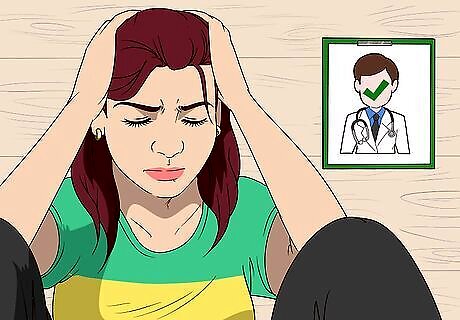
See your doctor if you have signs of a mental illness. You may be able to improve your mental health with natural treatments, but this doesn’t work for everyone. A mental illness is just as serious as a physical condition, so you need to see your doctor if you notice symptoms. While there is a wide range of mental illnesses with different symptoms, talk to your doctor if you have the following common symptoms: Mood changes or feeling sad Confusion or concentration problems Excessive fears, worries, or guilt Extreme fatigue Withdrawing from others Inability to cope with stress Trouble perceiving reality, such as paranoia or hallucinations Alcohol or drug abuse Thinking about self harm
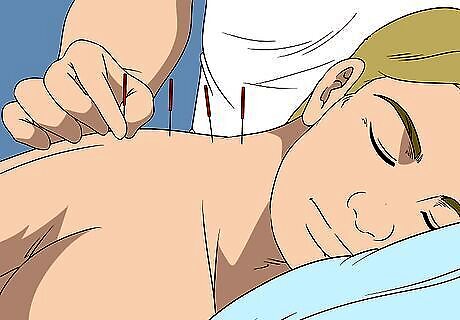
Consider using holistic doctors as an alternative to traditional medicine. Holistic doctors are trained to use alternative or natural treatments to help their patients get better. However, they also use conventional medication when it’s necessary. The goal of a holistic doctor is to figure out the root of your symptoms so that you can fully recover from what’s ailing you. See a holistic doctor if you’re trying to manage a chronic health condition or have unexplained symptoms that won’t go away. Typically, a holistic doctor will have gone to medical school but will also have training in alternative or complementary medicine. Holistic doctors often spend more time with their patients, so your appointment may last around 90 minutes. However, they’re also more expensive. Expect to spend between $100 to $500 for an appointment. Your insurance may not cover a holistic doctor, so check your coverage before you go.


















Comments
0 comment